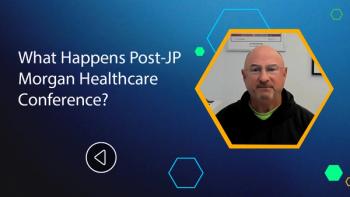
Semaglutide Supply Chain & Access Challenges
Scott Brunner, CEO, and Tenille Davis, Chief Advocacy Officer, of the Alliance for Pharmacy Compounding discuss specific challenges that have arisen in the supply chain for semaglutide and how to ensure that patients continue to have access to essential medications, particularly during shortages.
Scott Brunner, CEO, and Tenille Davis, Chief Advocacy Officer, of the Alliance for Pharmacy Compounding discuss the challenges faced by patients and healthcare providers due to drug shortages, particularly for semaglutide and other medications. It highlighted the role of compounding pharmacies in addressing these shortages and the importance of distinguishing legitimate compounding pharmacies from illicit actors. The conversation also emphasized the need for collaboration between pharmaceutical manufacturers, healthcare providers, and regulatory agencies to improve the drug supply chain and ensure patient access to essential medications.
Given the increasing complexity of the pharmaceutical supply chain, what specific challenges have arisen in the supply chain for semaglutide and other medications during the ongoing shortages? How can we ensure that patients continue to have access to essential medications, particularly during shortages?
Scott Brunner: We are in this remarkable period right now that is, well, it's remarkable in a lot of ways. It's very unusual, first of all, to have a branded drug on the FDA drug shortage list. About 80% of the drugs on the shortage list at any given time are generics, 20% or so branded drugs. We not only have a branded drug on the shortage list, we have a blockbuster branded drug on the shortage list that has life changing implications for millions of patients. And then on top of that, we have an extended shortage. Semaglutide has been on the GOP the FDA shortage list since March of 2022 tirzepatide, which FDA just moved off of the list last week, had been on the list since December of 2022 and so there was an extraordinary demand that the drug makers were not able to meet. And into that gap have stepped compounding pharmacies.
Compounding is allowed under the Food, Drug and Cosmetic Act in a couple of circumstances. One is when a prescriber judges that there's no appropriate FDA approved medication for a patient, and she can then prescribe a custom medication that is not commercially available. The other instance is where we find ourselves. The FDA approved drug is the appropriate drug, and yet it's not available. It's in shortage, and so compounders are allowed to create copies of FDA approved drugs when the drug appears as currently in shortage on the FDA drug shortage list. That is where we are, where we continue to be, with semaglutide in particular.
Tenille Davis: There's been some confusion in the media about the semaglutide and terzepatide shortage, saying like, how can compounding pharmacies get these active pharmaceutical ingredients if they're in shortage, especially because the drug makers have claimed they're not selling the active form of stable ingredient to compounders. So, one of the things that we like to correct is that there is no shortage of semaglutide the API or tirzepatide the API. What is in shortage is the FDA approved finished dosage form of Ozempic or Wegovy or Mounjaro in the pen devices or in the vial device, the new vials that are made by Eli Lilly, there's never been a shortage of semaglutide API, as evidenced by the fact that red belts, as tablets, which also contains semaglutide and are manufactured by Novo Nordisk, have never been in shortage either.
Compounding pharmacies have to source this API from the same sorts of FDA registered manufacturers that drug makers use. So, some drug makers manufacture their own API, but a lot of them, including some of our drug makers, in question, source API from contract manufacturers the same way that compounding pharmacies do. So just like to point that out, because there's been some confusion that if semaglutides not available, how are the pharmacies getting it? And if they are, are they taking away from the drug supply chain of the manufacturers? And that's just not how the whole system has worked.
Scott Brunner: Yeah, there's a there are a whole bunch of manufacturers of semaglutide FDA registered that are listed right now on the FDA website, aren't there, Tenille?
Tenille Davis: Yeah, I think more than a dozen manufacturers of semaglutide API, a few less than that of tours appetite API, but our FDA registered manufacturers, and those are registered with the with our Food and Drug Administration.
Newsletter
Lead with insight with the Pharmaceutical Executive newsletter, featuring strategic analysis, leadership trends, and market intelligence for biopharma decision-makers.




